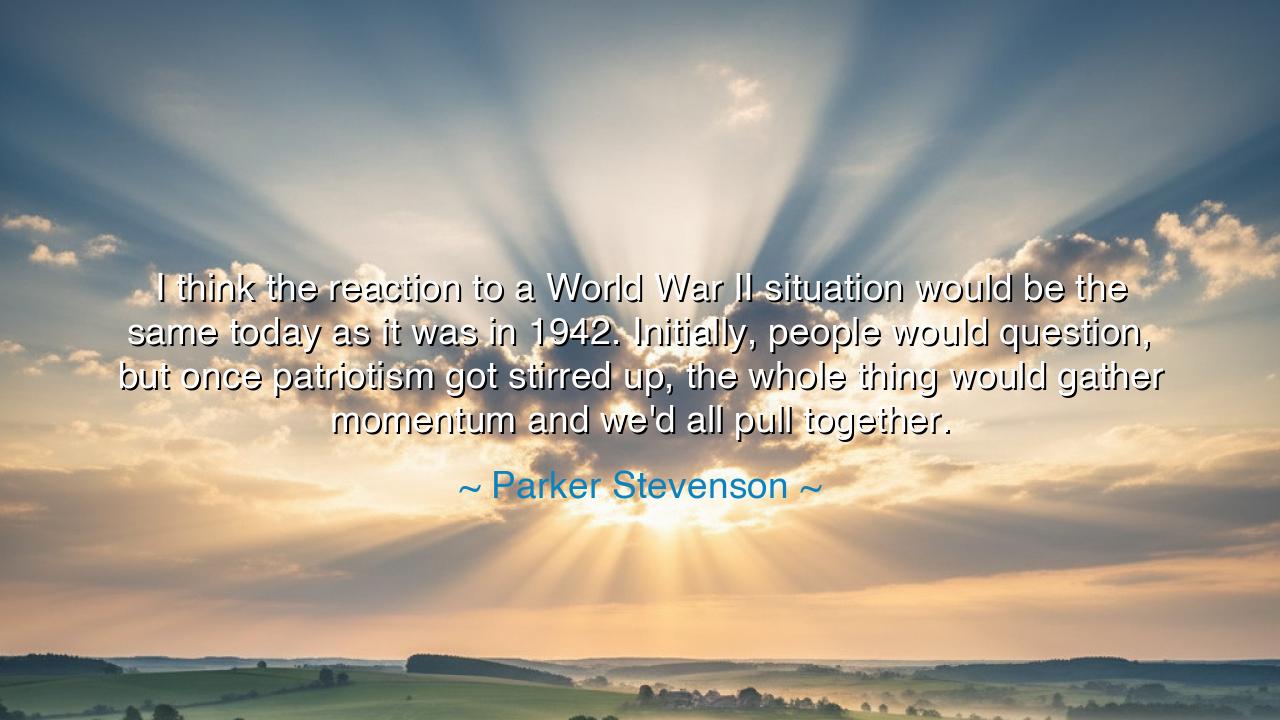
I think the reaction to a World War II situation would be the
I think the reaction to a World War II situation would be the same today as it was in 1942. Initially, people would question, but once patriotism got stirred up, the whole thing would gather momentum and we'd all pull together.






The words of Parker Stevenson—“I think the reaction to a World War II situation would be the same today as it was in 1942. Initially, people would question, but once patriotism got stirred up, the whole thing would gather momentum and we’d all pull together.”—speak to the mysterious force that lies dormant in the hearts of a people until crisis awakens it. At first, doubt and hesitation may rise, for human beings naturally shrink from sacrifice, uncertainty, and suffering. Yet when the bonds of love for one’s homeland, for one’s family, and for one’s community are stirred, there emerges a collective strength, a rising tide that unites many as one. This is the essence of patriotism—not idle sentiment, but the power to transform hesitation into action, and questioning into resolve.
The ancients often recorded such moments. In the chronicles of Greece, the Athenians wavered when the Persian armies came to conquer their land. Many doubted, some despaired. Yet when the call of patriotism was stirred, when their leaders reminded them of their homes, their temples, and their ancestors, they rallied at Salamis and turned the tide of history. Doubt gave way to unity, and unity gave birth to victory. Stevenson’s reflection echoes this timeless pattern: that when danger presses upon a nation, the spirit of unity and sacrifice rises like a sleeping giant.
In the days of World War II, the same truth was revealed. In America, the attack on Pearl Harbor was a shock that at first sowed confusion. People asked, “Why now? Why us? What will this mean for our future?” But soon the fires of patriotism blazed. Factories were repurposed overnight, men enlisted in droves, women stepped into new roles in fields and factories, and communities tightened their bonds. In Britain, too, the people of London endured the Blitz with unyielding courage, pulling together as one family beneath the falling bombs. Fear was real, but unity was stronger.
Stevenson’s words remind us that though times change, the human heart does not. Even today, in an age of technology, distraction, and division, when a great crisis comes, people can still find the strength to set aside differences and stand together. For patriotism is not bound to a particular year or generation—it is the ancient spirit of belonging and sacrifice that has always called ordinary men and women to extraordinary deeds.
Yet his words also contain a warning. This stirring of unity should not require catastrophe to awaken it. Too often we wait for disaster before we remember that we are one people, bound by shared destiny. We quarrel in times of peace, dividing ourselves by party, by class, by creed, forgetting that the true measure of a people is not how they fight against one another, but how they stand together when challenged. The challenge for us is to remember in times of calm what others remembered only in times of war: that unity is strength, and division is weakness.
The lesson is clear. Patriotism is more than a reaction to crisis—it is a discipline to be cultivated. Do not wait for the world to fall into ruin before you learn to pull together with your neighbors. Practice solidarity now: in small sacrifices for the common good, in kindness that binds communities, in service that uplifts the forgotten. In this way, when the storms of history do come—as they surely will—you will not need to wait for momentum to gather, for the habit of unity will already live within you.
Practical action flows from this wisdom. Begin by asking not, “What benefits me?” but, “What benefits us?” Share burdens with those around you, give to the weak, and strengthen the bonds of community. Honor your country not only in times of peril but also in times of peace. Teach your children that patriotism is not only banners and songs, but the daily act of pulling together, of choosing unity over division. Thus, when crisis stirs the nation again, as Stevenson foresaw, the people will rise swiftly, not out of desperation, but out of a strength long nurtured.
Therefore, let Stevenson’s words be carried forward: when trials come, the spirit of patriotism will turn hesitation into momentum and many into one. But the wise will not wait for 1942 to repeat itself—they will live now as if the call has already been sounded, building unity in their daily lives, so that when history demands it, they may already stand strong together.






AAdministratorAdministrator
Welcome, honored guests. Please leave a comment, we will respond soon